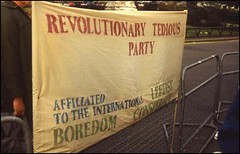An interesting discussion of different ways to scale grades using algorithms over at Worthwhile Canadian Initiative. The comments are at least as interesting as the post. In the comments, the value of grades emerges as a central concern.
Grades have two main uses:
- Social
- Pedagogical
Students believe that this equation represents the world perfectly. They are not entirely wrong.
With that in mind, the crucial context that makes it possible to put grades to any use is the relative expectations that presumably animate the teacher's instruction. I always think of this context as having three layers:
- The student's performance vis-à-vis his/her peers in this particular course (during this semester, with these students)
- The student's performance vis-à-vis other cohorts taking more of less the same course (i.e., compared to all students who've taken this course with me)
- The student's performance vis-à-vis the universe of students who have ever taken, are now taking, or will take a course more or less equivalent to this one, in any institution and with any instructor.
There are several universities in the US at which students are given feedback but no grades. Hampshire College, for example, provides no grades: at the end of each course, the teacher and the student both draft a 300-400 word narrative discussing the student's performance. These narratives form the body of the student's "transcript." These transcripts are made available to the entire student body as well as to other institutions at the student's request. I took two courses at Hampshire, and I found the students to be engaged, engaging, and highly motivated. (Since I attended a different school, which did give grades, my teachers gave me a grade, but I can tell you that the narratives they wrote are far more precious to me. I still have them.)
Even though they still publish evaluations of each student's performance, such institutions obviously have a strong position on the social value of grades. An interesting thought experiment that really pushes the distinction between social and pedagogical uses to its limit is to imagine a university that gives grades, but does not publish them. Students are told what grades they have received, but the records are then destroyed, so that no one can "prove" anything. The students' transcripts are simply the lists of the courses they've taken. Anyone could say he'd gotten an A, but only he and his teacher know for sure, and no on can prove anything. Wouldn't teachers and students then simply regard the grades are a rather autistic and reductive form of feedback? Would giving grades be worth the trouble? Would teaching per se be easier or harder? Relative performance would still need to be graded, in the strict sense of the word, but since the social value of the grade has been eliminated, the only value left is its pedagogical value. So what IS the pedagogical value of a grade?




















